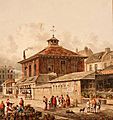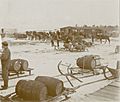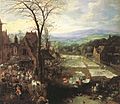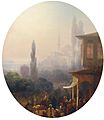Market town facts for kids
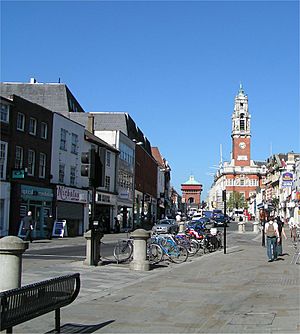
A market town is a special kind of town in Europe that was given a legal right to hold markets. This idea started a long time ago, during the Middle Ages. These towns were different from small villages and big cities because they had a special permission, often called a 'charter', to host regular markets. Even today, some towns are still called market towns, even if they don't have a market anymore, as long as they still have that old right.
Contents
What is a Market Town?
A market town was a place where people could buy and sell goods regularly. Imagine a big outdoor shopping center, but from hundreds of years ago! These towns were given a special permission, usually by a king or a powerful lord. This permission, called a market charter, allowed them to set up a market on certain days of the week. This made them very important centers for trade and business.
Why were Market Towns Important?
Market towns were super important for many reasons:
- Trade and Economy: They were the main places where farmers could sell their crops and animals. Craftspeople could also sell their handmade goods. This helped the local economy grow.
- Meeting Places: Markets were not just for shopping. They were also social hubs where people from different villages could meet, share news, and even find out about jobs.
- Growth of Towns: Having a market helped towns grow bigger and richer. More people moved there, and more businesses opened up.
- Local Law and Order: Markets often had their own special rules and courts to make sure trading was fair and peaceful.
How Towns Got Market Rights
In the Middle Ages, a town didn't just decide to have a market. It needed official permission. This permission was usually granted by the king or queen, or sometimes by a powerful noble. They would issue a document called a charter. This charter gave the town the legal right to hold a market.
What a Market Charter Meant
Getting a market charter was a big deal for a town. It meant:
- Official Recognition: The town was officially recognized as a place of trade.
- Protection: The market and its traders often received protection from the law.
- Income: The town could collect taxes or fees from traders, which helped fund local services.
- Status: Being a market town gave a settlement higher status than a simple village.
Life in a Market Town
Life in a market town revolved around the market days. These were often busy and exciting times.
Market Day Activities
On market days, the town square or a special market area would fill up with stalls and people.
- Selling Goods: Farmers brought fresh produce, meat, and dairy. Weavers sold cloth, blacksmiths sold tools, and potters sold pots.
- Buying and Bartering: People came from miles around to buy what they needed. Sometimes, instead of money, they would trade goods directly.
- Entertainment: Sometimes, there would be entertainers, musicians, or storytellers, making the market a lively place.
- News and Gossip: It was a chance to hear the latest news from other areas and catch up with friends and family.
Market Crosses and Halls
Many market towns had special features:
- Market Cross: This was a stone cross often found in the center of the market square. It was a symbol of the market's legal right and sometimes used for official announcements.
- Market Hall: Later, some towns built market halls. These were buildings where traders could sell their goods indoors, protected from the weather.
Market Towns Today
Even though many towns don't have the same kind of bustling medieval markets anymore, the idea of a market town still exists.
- Historic Name: Many towns still use "Market" in their name, like Market Harborough or Market Drayton. This shows their historical importance.
- Modern Markets: Some market towns still hold regular markets, though they might be smaller or focus on local produce or crafts.
- Community Hubs: Today, market towns often remain important local centers for shopping, services, and community events.
Images for kids
-
Shrewsbury market square
-
The market square (Marktplatz) in Wittenberg, Germany, 2005
-
Market cross in a market, French, c. 1400
-
Market hall, Invalidenstraße, Berlin, Germany
-
Main market street in Miskolc, 1884
-
Fish market, Bergen, Norway, c. 1890
-
Market and customs house, Porsgrunn, c. 1891-1910
-
Birmingham Market Charters 1166 and 1189
-
Market cross, Lambourn erected in 1446
-
Salisbury chartered market
-
Sedbergh chartered market
-
Market Square, Huntingdon.
-
Northampton Market, established in around 1255
-
Altrincham, Chartered Market
-
Corner of the market square in Horncastle, given its charter in the 13th century
-
Kelso Farmers Market, Scotland with cobbled square in the foreground
-
Market Scene by Pieter Aertsen, 1550
-
Rustic Market (Nundinae Rusticorum) by Pieter Bruegel the Elder, 1555–56
-
Fish Market by Joachim Beuckelaer, 1568
-
Peasants going to the market, Peter Paul Rubens, c. 1602
-
Market by Alessandro Magnasco, first half 18th century
-
Market at Aberystwith, sepia print by Samuel Ireland, 1797
-
'Returning from Market', oil painting by Augustus Wall Callcott, c. 1834
-
The Fish market in Woudrichem by Jan Weissenbruch, 1850
-
Market Day at Zaltbommel by Elias Pieter Van Bommel, 1852
-
A market day in Bangor by John J Walker, 1856
-
A market scene in Constantinople by Ivan Aivazovsky, 1860
-
Pwllheli Market in Wales, watercolour by Frances Elizabeth Wynne, c. 1866
See also
 In Spanish: Ciudad de mercado para niños
In Spanish: Ciudad de mercado para niños
 | Bayard Rustin |
 | Jeannette Carter |
 | Jeremiah A. Brown |








